 Petzlover
Petzlover Cardigan Welsh Corgi is originated from United Kingdom but Tea Cup Chihuahua is originated from Mexico. Both Cardigan Welsh Corgi and Tea Cup Chihuahua are having almost same height. Cardigan Welsh Corgi may weigh 11 kg / 25 pounds more than Tea Cup Chihuahua. Both Cardigan Welsh Corgi and Tea Cup Chihuahua has almost same life span. Both Cardigan Welsh Corgi and Tea Cup Chihuahua has almost same litter size. Cardigan Welsh Corgi requires Low Maintenance. But Tea Cup Chihuahua requires Moderate Maintenance
Cardigan Welsh Corgi is originated from United Kingdom but Tea Cup Chihuahua is originated from Mexico. Both Cardigan Welsh Corgi and Tea Cup Chihuahua are having almost same height. Cardigan Welsh Corgi may weigh 11 kg / 25 pounds more than Tea Cup Chihuahua. Both Cardigan Welsh Corgi and Tea Cup Chihuahua has almost same life span. Both Cardigan Welsh Corgi and Tea Cup Chihuahua has almost same litter size. Cardigan Welsh Corgi requires Low Maintenance. But Tea Cup Chihuahua requires Moderate Maintenance
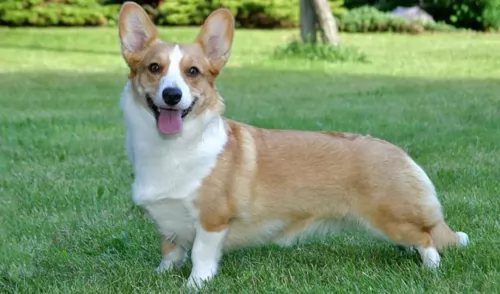 The Cardigan Welsh Corgi, named after Cardiganshire, Wales, is an ancient breed, brought to Wales by the Celts about 3,000 years ago.
The Cardigan Welsh Corgi, named after Cardiganshire, Wales, is an ancient breed, brought to Wales by the Celts about 3,000 years ago.
Small but tough, the Cardigan used to take part in cattle drives and his duties extended to protecting them at night.
The first pair of breeding Cardigans arrived in the United States in June 1931. The AKC granted full recognition to the breed four years later.The Cardi, as the breed is commonly called, was developed as an all-around farm dog in Wales. It is believed to be a descendant of the Pomeranian, Schipperkes, Keeshond and Swedish Valhund.
The Cardigan and the Pembroke Welsh corgis were separated officially into different breeds in the early 1930s. AKC recognition came in 1935.
 Chihuahua is a state in the country of Mexico. From this state, the dog breed Chihuahua and the “teacup, or toy” chihuahua take their name. Interestingly the Chihuahua Club of America maintains that “teacup” Chihuahuas do not exist and that the size differential is normal for the breed. Chihuahuas or their ancestors have been around a very long time, sadly the exact origins of the Chihuahua are lost into the pages of history, but archaeological clues such as wheeled dog toys, art, and pottery link the Chihuahua to Mexico and to the Techichi dog. The Techichi dog at the time of the Spanish Conquistadors was sold for food (not unlike we sell beef or chicken) and also as a companion dog to death. Cortez even mentioned the Techichi dog in a letter sent back to Spain, describing them as being raised for food and sold in the marketplace.
Chihuahua is a state in the country of Mexico. From this state, the dog breed Chihuahua and the “teacup, or toy” chihuahua take their name. Interestingly the Chihuahua Club of America maintains that “teacup” Chihuahuas do not exist and that the size differential is normal for the breed. Chihuahuas or their ancestors have been around a very long time, sadly the exact origins of the Chihuahua are lost into the pages of history, but archaeological clues such as wheeled dog toys, art, and pottery link the Chihuahua to Mexico and to the Techichi dog. The Techichi dog at the time of the Spanish Conquistadors was sold for food (not unlike we sell beef or chicken) and also as a companion dog to death. Cortez even mentioned the Techichi dog in a letter sent back to Spain, describing them as being raised for food and sold in the marketplace.
When a death occurred a dog was chosen as a companion and cremated with the deceased. It was believed that the dog helped the soul of the decedent reach their eternal destination. The Techichi dog from which the modern-day chihuahua likely descended was very plentiful in the central American area that is now the country of Mexico and raised by the ancient Toltecs and later the Aztec people.
Chihuahuas are little dogs and come in a variety of coats, head shapes and even (within the designation small) sizes. The designation “teacup, toy or pocket” while not an official breed name is a useful descriptor, since they are the littlest of an already small breed and these minute pets, as puppies, may fit into a teacup or a pocket.
Fortunately while no longer a food source, the chihuahua is now sought after as a loyal and lively pet and companion.
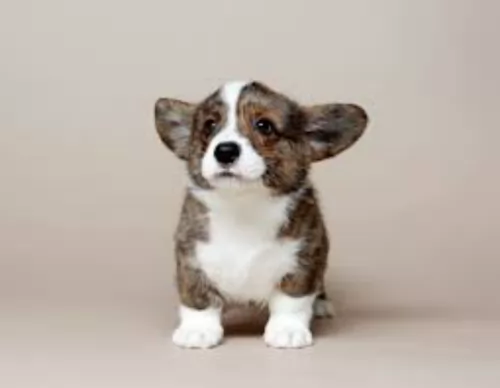 The long-shaped Cardiganshire Welsh Corgi is also nicknamed the ‘yard-long dog’ in Wales. Don’t be fooled by this low-to-the-ground dog, because when you look at him he isn’t a small dog at all, looking almost like a German shepherd with short legs, upright ears and a long, bushy tail.This is unlike the Pembroke Welsh Corgi whose tail is traditionally docked.
The long-shaped Cardiganshire Welsh Corgi is also nicknamed the ‘yard-long dog’ in Wales. Don’t be fooled by this low-to-the-ground dog, because when you look at him he isn’t a small dog at all, looking almost like a German shepherd with short legs, upright ears and a long, bushy tail.This is unlike the Pembroke Welsh Corgi whose tail is traditionally docked.
The Cardi stands around 270 to 330mm tall at the withers and weighs between 11 to 17kg. With those short legs he can gather up quite a speed as well. The dog has a double coat in fawn, red, black and with the outer coat being of medium length and quite harsh to the touch. You can also find some white on the neck, chest as well as on the legs.
The Cardigan Welsh Corgi is full of spirit and makes a fantastic companion for someone looking for a fun-loving, devoted friend. He is an easy going dog, making a wonderful pet, while being reserved with strangers. He isn’t a tall dog but he will guard the family too. He is good with children in the family and even with other pets, provided he is trained and socialized.
 Chihuahuas are small. Even the bigger ones are only about six pounds and a “teacup” or “toy” is often three pounds or less. Their bodies are slightly longer than they are tall, but even the tallest are not over nine inches. Chihuahua standing under five inches in height is not uncommon in the “teacup” or smallest of these dogs. They have two different head types and a domed skull. One type of head shape is like a deer while the other is described as an apple-shaped head. The apple-shaped heads are more popular than the deer shaped heads, although sometimes in the “teacup” especially the soft spot fails to close at maturity when growth is complete and the bones should knit, therefore leaving a soft spot in their skull – this is called a molera.
Chihuahuas are small. Even the bigger ones are only about six pounds and a “teacup” or “toy” is often three pounds or less. Their bodies are slightly longer than they are tall, but even the tallest are not over nine inches. Chihuahua standing under five inches in height is not uncommon in the “teacup” or smallest of these dogs. They have two different head types and a domed skull. One type of head shape is like a deer while the other is described as an apple-shaped head. The apple-shaped heads are more popular than the deer shaped heads, although sometimes in the “teacup” especially the soft spot fails to close at maturity when growth is complete and the bones should knit, therefore leaving a soft spot in their skull – this is called a molera.
Like different shaped heads chihuahua may have long hair or short-haired coats. The short-haired coats are smooth. The Chihuahua coats may be a large variety of colors ranging from black to white, with red, brown, fawn, cream and chocolate and they may be solid-colored, spotted or sabled. Personal preference is the determining factor on the type of coat a pet Chihuahua has since the breed does not have a preferred color, pattern, hair length or feel. Their muzzle (nose/mouth combination) is short and pointed. Chihuahua have have naturally erect pointed ears and large round eyes. A Chihuahuas tail is relatively long and mostly either curled up and over the back or carried up.
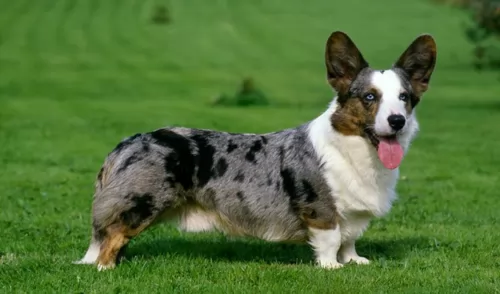 The Cardigan Welsh Corgi is full of surprises and he has been a strong working job, being quick and agile around cattle. He is good at everything and with training and socialization he is going to make an excellent pet.
The Cardigan Welsh Corgi is full of surprises and he has been a strong working job, being quick and agile around cattle. He is good at everything and with training and socialization he is going to make an excellent pet.
They are good with children and other pets and he makes an excellent guard dog as well. He is strong willed and feisty but he wants to please his owner. With a dog like this in your life, you’re going to have a faithful and loving friend who knows how to entertain you as well with his antics.
 Children friendliness very interactive with family but has been known to nip at small children and bark, so no not really
Children friendliness very interactive with family but has been known to nip at small children and bark, so no not really
3. Adaptability yes but they are better off in apartments and homes not out in the country where their size makes them targets for predators.
4. Learning ability average ability to learn but Chihuahua can be but stubborn which may impact ability and willingness to learn.
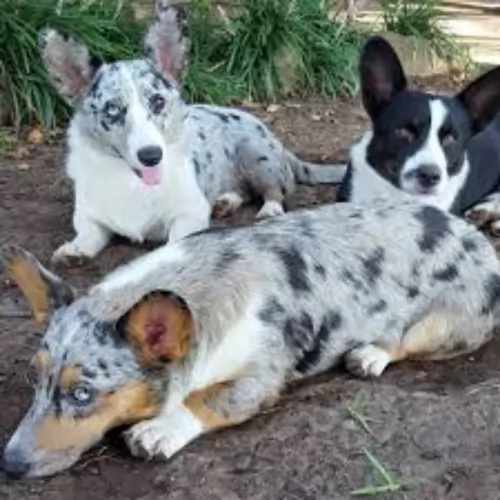 The Cardigan Welsh Corgi is a generally healthy breed with an average lifespan of 12-15 years. Like all dogs, they will have some health concerns, and recognizing the symptoms of some common dog illnesses can spare your pet.
The Cardigan Welsh Corgi is a generally healthy breed with an average lifespan of 12-15 years. Like all dogs, they will have some health concerns, and recognizing the symptoms of some common dog illnesses can spare your pet.
This is a debilitating genetic joint condition that can affects any dog really. It occurs when the hind leg joint isn’t held properly by the hip socket. Bone is worn away and your dog can experience severe pain.
Unfortunately this is a common skeletal disorder and your pet will be reluctant to jump or play. Untreated, it can lead to arthritis and chronic pain, making him immobile. There are several types of treatments and you want to get your pet to the vet to relieve him of pain and discomfort.
This is a terrible disease for your pet because the rear legs can actually become paralyzed and your pet won’t be able to control their bowels. It is an inflammatory autoimmune disease where the dog’s immune system cells attack the spinal cord sheath. If your vet suspects Degenerative Myelopathy, a blood sample will be required. Sometimes the dog has to be mercifully euthanized. Sometimes people even turn to holistic treatments to avoid this and help their pet.
 Chihuahuas live on average fourteen to eighteen years. There are some issues that may cause concern or lower life expectancy.]
Chihuahuas live on average fourteen to eighteen years. There are some issues that may cause concern or lower life expectancy.]
• Hypoglycemia (low blood sugar) is something to watch for. Low blood sugar can cause death in just a few hours but when caught is very easily treated. Some of the symptoms are being uncoordinated when walking, acting sleepy or lethargic, unfocused sight, fainting, having a seizure or having spasms in the muscles of the neck. First aid can right this condition with a sweet supplement like corn syrup, or honey. This is more common in puppies, but the teacup chihuahuas are susceptible.
• Hydrocephalus (water on the brain) can affect many toy dog breeds. The puppy or dog will appear to have an oversized head, and be slow (display lethargy) and grow slower than its littermates.
• Pulmonic stenosis (a heart condition) occurs when the right ventricle is impeded. Teacup Chihuahuas are also susceptible to heart murmurs.
• Collapsed trachea this occurs when the cartilaginous rings in a Chihuahua do not form completely or weaken. This can be hereditary or an acquired condition and occurs in other small breeds of dog.
• Molera – where after finishing growth a soft spot remains in the skull and the bones do not knit. As a puppy, the owner must remain vigilant about head injuries.
• Obesity (overweight). Most of the time this is a result of the Teacup Chihuahua being overfed. Obesity can contribute to a shortened lifespan and chronic bronchitis.
• Cold susceptibility. Cold weather can cause Teacup Chihuahuas to shiver or tremble when exposed and during cold temperatures, the dogs may need to wear a sweater and boots outside and cuddle with their owners under blankets or bask in the sun to stay warm.
• Infected or injured eyes. Due to the prominent eyes, exposure to irritants such as dust, allergens, or dry air can cause the dog to develop this beginning with watering eyes.
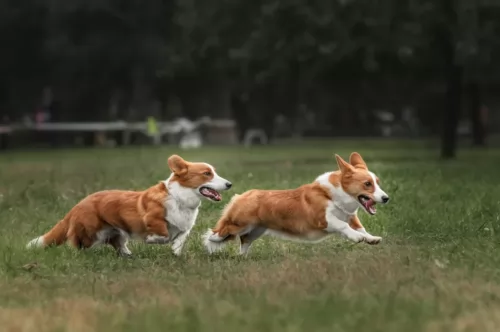 Cardigan Welsh corgis are active dogs and he is going to need daily exercise. He’ll love a walk with you and will show you how agile he is when you throw a ball for him
Cardigan Welsh corgis are active dogs and he is going to need daily exercise. He’ll love a walk with you and will show you how agile he is when you throw a ball for him
The Cardigan is a low maintenance dog. His thick double coat does shed quite a bit but nonetheless it is easy to maintain. Simply give it a good brush to remove loose hairs and to get rid of dirt. This brushing distributes the dogs natural oils and helps to keep the coat shiny and healthy.
 1. Feeding the Puppies. Puppies should be fed four times a day. Underfeeding can cause the issues of low blood sugar and overfeeding can result in obesity increasing the risk of other health complications.
1. Feeding the Puppies. Puppies should be fed four times a day. Underfeeding can cause the issues of low blood sugar and overfeeding can result in obesity increasing the risk of other health complications.
2. Feeding the Adult. Adult teacups are also vulnerable to hypoglycemia and obesity. Of course, the low blood sugar will be much more acute than obesity and need prompt care if it occurs. Adult teacups should be fed twice a day.
3. Points for Good Health. The chihuahua generally exhibits more vigor and endurance than pet owners expect from such a small breed of dog.
4. Games and Exercise for Teacup Chihuahua. Go ahead and run and play but remember even with the unexpected stamina and endurance this is a very small dog, small legs, using discernment, judgment, and restraint so the games and exercise is fun and builds health and is a special bonding time, without jeopardizing the sugar levels or causing exhaustion or misery.